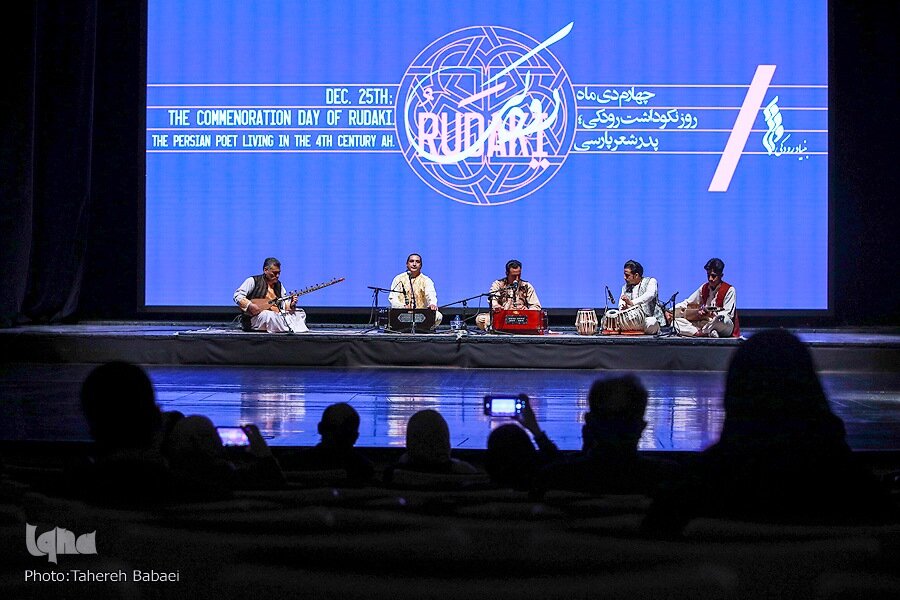Persian poet Rudaki product of Samanids’ economic, cultural boom, litterateur says

TEHRAN – Rudaki expert Neder Karimian says that the poet who is considered as the father of Persian poetry is the product of the economic and cultural boom and the political splendor Iran experienced during the Samanid dynasty over a millennium ago.
Speaking during a meeting organized on Saturday at Tehran’s Vahdat Hall to celebrate Rudaki’s birthday, he said, “The period can be considered one of the most important periods of history, during which Iran witnessed a scientific and historical renaissance.”
The 4th of the month of Dey on the Iranian calendar, which fell on December 25 this year, has been registered as the day of Rudaki by the General Culture Council of Iran.
The day will be registered officially on the 1401 calendar of the Iranian year.
“Celebration of Rudaki is a celebration of Persian literature and Iranian moralities, because Rudaki is a popular poet who never eulogizes rulers,” noted Karimian, who has compiled articles on Rudaki in a collection that was introduced at the celebration.
Reciting a poem from Rudaki, Karimian said, “In this poem, Rudaki presents four major topics: contentment, justice, living with freedom and joy in life, encouraging people to live happily in the contented society of the Samanid period, during which scientific, cultural, political and economic activities advanced side by side and the poet is the product of such a society.”
“We should seek cultural diplomacy. Today, our society needs Rudaki’s teachings. We live in a period dominated by many political maladies; we need integrity more than ever and figures such as Rudaki can restore that integrity,” he noted.
The Tajik president of the ECO Cultural Institute, Sarvar Bakhti, Afghanistan’s Elites Organization director Hesameddian Taleqani and Iran’s Minister of Culture and Islamic Guidance, Mohammad-Mehdi Esmaeili, also attended the celebration.
Starting his speech by reciting a poem by Rudaki, Bakhti said, “Rudaki lived among ordinary people and was attracted to the Samanid court due to his popular fame.”
“He was well aware of the pains and needs of the people of his time and established his great poetry based on the study of other poets of the time and the past, and this perspective makes his poetry some of the best examples in Persian literature and the world’s poetry,” he added.
He also praised Iran for designating a day on its national calendar for Rudaki and noted, “Rudaki is the founder and pioneer of Persian literature in the historic region and we should do more to celebrate this great man of Persian literature.”
Rudaki, the byname of Abu Abdollah Jafar ibn Mohammad, was born c. 859 in Rudak, Khorasan and died in 940/941. He was the first poet of note to compose poems in the “New Persian,” written in the Arabic alphabet, and consequently, he is widely regarded as the father of Persian poetry.
A talented singer and instrumentalist, Rudaki served as a court poet to the Samanid ruler Nasr II (914–943) in Bukhara until he fell out of favor in 937.
He ended his life in wretched poverty. Approximately 100,000 couplets are attributed to Rudaki, but of that enormous output, fewer than 1,000 have survived, and these are scattered among many anthologies and biographical works.
His poems are written in a simple style, characterized by optimism and charm and, toward the end of his life, by touching melancholy.
In addition to parts of his divan (collection of poems), one of his most important contributions to literature is his translation from Arabic into New Persian of Kalilah wa Dimnah, a collection of fables of Indian origin.
Later retellings of these fables owe much to this lost translation by Rudaki, which further ensured his fame in Perso-Islamic literature.
Photo: An Afghan ensemble performs during Persian poet Rudaki’s birthday celebration at Tehran’s Vahdat Hall on December 25, 2021. (IQNA/Tahereh Babai)
MMS/YAW

Leave a Comment